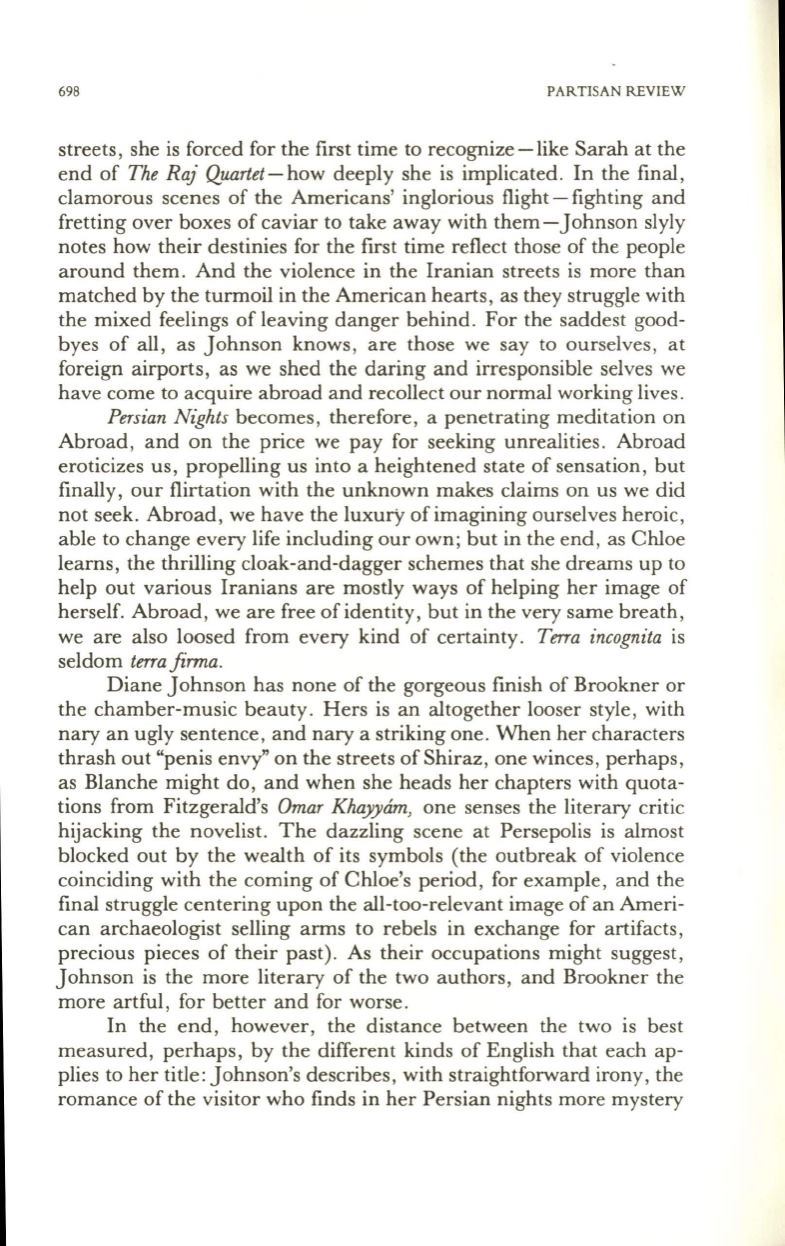
698
PARTISAN REVIEW
streets, she is forced for the first time to recognize -like Sarah at the
end of
The Raj Quartet-how
deeply she is implicated. In the final,
clamorous scenes of the Americans' inglorious flight - fighting and
fretting over boxes of caviar to take away with them-Johnson slyly
notes how their destinies for the first time reflect those of the people
around them. And the violence in the Iranian streets is more than
matched by the turmoil in the American hearts, as they struggle with
the mixed feelings of leaving danger behind. For the saddest good–
byes of all, as Johnson knows, are those we say to ourselves, at
foreign airports, as we shed the daring and irresponsible selves we
have come to acquire abroad and recollect our normal working lives.
Persian Nights
becomes, therefore, a penetrating meditation on
Abroad, and on the price we pay for seeking unrealities. Abroad
eroticizes us, propelling us into a heightened state of sensation, but
finally, our flirtation with the unknown makes claims on us we did
not seek. Abroad, we have the luxury of imagining ourselves heroic,
able to change every life including our own; but in the end, as Chloe
learns, the thrilling cloak-and-dagger schemes that she dreams up to
help out various Iranians are mostly ways of helping her image of
herself. Abroad, we are free of identity, but in the very same breath,
we are also loosed from every kind of certainty.
Terra incognita
is
seldom
terra firma.
Diane Johnson has none of the gorgeous finish of Brookner or
the chamber-music beauty . Hers is an altogether looser style, with
nary an ugly sentence, and nary a striking one. When her characters
thrash out "penis envy" on the streets of Shiraz, one winces, perhaps,
as Blanche might do, and when she heads her chapters with quota–
tions from Fitzgerald's
Omar Khayyam,
one senses the literary critic
hijacking the novelist. The dazzling scene at Persepolis is almost
blocked out by the wealth of its symbols (the outbreak of violence
coinciding with the coming of Chloe's period, for example, and the
final struggle centering upon the all-too-relevant image of an Ameri–
can archaeologist selling arms to rebels in exchange for artifacts ,
precious pieces of their past). As their occupations might suggest,
Johnson is the more literary of the two authors, and Brookner the
more artful, for better and for worse.
In the end , however, the distance between the two is best
measured, perhaps, by the different kinds of English that each ap–
plies to her title : Johnson's describes, with straightforward irony, the
romance of the visitor who finds in her Persian nights more mystery


